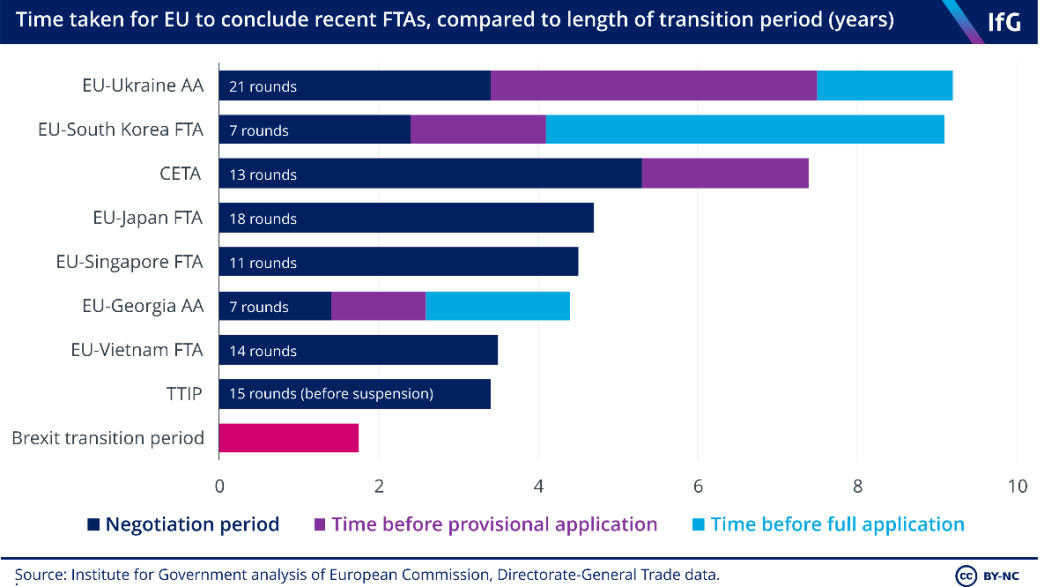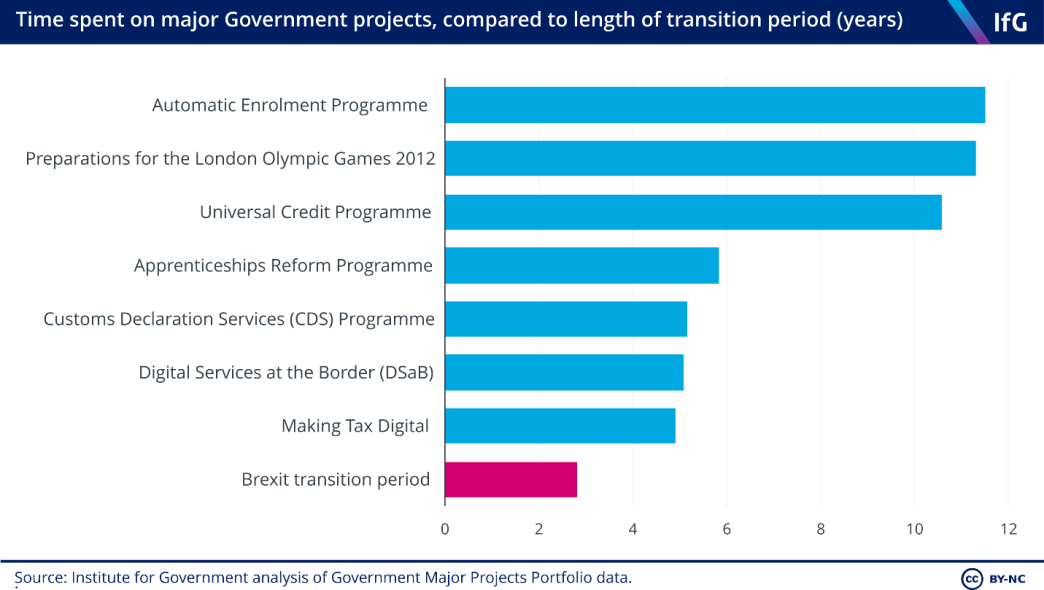A longer Brexit transition is a prize worth pocketing
An extension to the transition period won’t solve the Irish backstop problem, but an extra 12 months is still an offer worth having.
The Prime Minister is considering an extension to the 21-month transition period that will follow withdrawal from the EU. Joe Owen argues that it won’t solve the Irish problem, but an extra 12 months is still an offer worth having.
Negotiators and their political masters are looking for a breakthrough in Brexit negotiations. They need something that will push things forward, unlock agreement on the Irish Border and get talks over the line in the coming weeks. Their latest plan: a 12-month extension to the 21-month transition.
An extra year or so would be a prize for those – on both sides of the Channel – faced with the Herculean task of negotiating a detailed future relationship and implementing it by December 2020. It would reduce the risk of the UK facing a second cliff-edge in mid-2020 with another no deal deadline looming. And it would increase the chances of a smooth transition to the new relationship.
The UK was always more pragmatic about a Brexit transition time limit than the EU
In her Florence speech, in September 2017, the Prime Minister first admitted the UK would need time after Article 50 for negotiating the future relationship and preparing new systems. How long would it last? That, she said, “should be determined simply by how long it will take to prepare and implement the new processes and new systems”.
Referencing the changes to the immigration system, the PM said that current estimates pointed to a time of “around two years”. But “around” can mean many things when it comes to government timelines – the much-anticipated immigration White Paper was due “around” summer 2017.
It was not then-Cabinet members, David Davis or Boris Johnson, who slapped a 21-month deadline on the interim-period – or indeed the Prime Minister's backbench critics. It was the EU.
Brussels said the interim period should end at a time that was administratively convenient for them, at the end of their seven-year funding cycle. But no doubt they felt that a cliff-edge in the middle distance would be a helpful tool in forcing concessions from the UK in future relationship talks as the deadline loomed.
21 months is very unlikely to be enough to negotiate the kind of Brexit the UK is pursuing
It doesn’t matter if the UK opts for Chequers, Canada +++, Super Canada or SuperChequers +++, the reality is that 21-months is not long enough to conclude the talks. The UK and EU would need to reach agreement on trade, security and cross-cutting issues like data, all in a shorter period than the EU takes to negotiate less ambitious deals.

Yes, you can argue that Brexit is ‘unprecedented’ – the UK is starting from complete convergence with EU rules. But it’s also ‘unprecedented’ in plenty of less helpful ways, in that Brexit is about two sides moving apart. It also has a fall-back position of significant disruption rather than the status quo. That makes the threat of walking away much harder to make credibly.
But the negotiators won’t even be able to bank the full 21 months. In a case of very bad timing, the European Parliament elections in May means that nothing will happen until they’re back before the summer. But then there will need to be a new Commission and new Commission president. That could mean technical talks but not much more until October/November 2019. That doesn’t even take account of the time needed to complete a ratification process far more complex than for the withdrawal agreement.
The systems and processes needed for a new relationship won’t be ready by December 2020
You can’t implement a new relationship until you know what it’s going to be. The UK and EU may agree a political declaration on the future relationship in the coming weeks, but that’s subject to change and likely to be pretty fluffy in pretty important places.
When it comes to designing new border systems or regulatory structures, that kind of detail matters. But so does time. Even if the UK had the necessary detail by next week, a 21-month transition would be heroic to get the systems in place. If it’s not agreed until mid-late 2020, it’s impossible.

Securing an extra year is sensible, but it doesn’t solve the Prime Minister’s Irish problem
Some EU lawyers think that without an extension clause in the withdrawal agreement, there would be no possibility of avoiding that deadline. At the very least, the UK would be the demandeur, and forced to “buy” a concession from the EU during the talks.
Brexiteers may object to another year of “vassalage” and “vast sums of money” being paid to the EU, but the reality is that a 21-month transition was never going to be enough and the bill for extending it – ensuring a smooth Brexit – is unavoidable. It’s much more sensible to secure an extension now.
But all this applies only if the PM gets a withdrawal agreement. Her problem now is how she gets to March 2019 and comes out the other side into any transition. The hope is that bolting on 12-months will assure the UK Cabinet and Parliament that the EU’s ‘Irish backstop’ – politically toxic to many in Westminster - would never be used. It might marginally reduce the possibility – but on its own it can’t offer a guarantee.
For many in Westminster, the problem with the EU’s proposal is not how likely it is to come into force, but the principle. It is hard to imagine them being mollified by an extended transition, but while it won’t fix the Prime Minister’s big problem, now it’s on offer, it’s worth having.
- Topic
- Brexit
- Keywords
- Trade Withdrawal Agreement
- United Kingdom
- Northern Ireland
- Administration
- May government
- Publisher
- Institute for Government